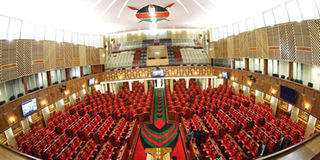Breaking News: At least 10 feared to have drowned in Makueni river
Incoming MPs set to earn less perks under new rule

PHOTO | FILE The refurbished chambers of Parliament. Incoming MPs will be paid less than their predecessors. They will also have to take a car loan at three per cent but their mortgage was raised.
What you need to know:
- The new terms by the SRC have also put a cap on sitting allowances for MPs who are members of House committees of the National Assembly and the Senate
- All MPs will earn a minimum salary of Sh532,500 that will eventually progress to a maximum of Sh710,000 by completion of their parliamentary term
- Since their election last Monday, some MPs have been to Parliament seeking to access services such as salary advances but were informed that they could only do so after they are formally sworn-in
MPs perks have been reduced just a week after the Salaries and Remuneration Commission reduced their salaries from Sh850,000 to Sh532,500.
The commission — which is seeking ways to reduce the public wage bill — has now ensured that incoming MPs will not enjoy the privileges of duty-free vehicles like their predecessors.
Instead, incoming MPs will be given a Sh7 million loan to buy a vehicle of their choice and repay with a three per cent interest. The loan, which is an entitlement, will have to be repaid within five years or before the end of the term of the 11th Parliament.
In the past, the Parliamentary Service Commission has been giving newly-elected MPs a Sh3.3 million grant to buy a vehicle whose duty was paid for by the State. This has been one of the privileges that MPs have enjoyed and is likely to be a huge disappointment for members of the 11th Parliament.
The new terms by the SRC have also put a cap on sitting allowances for MPs who are members of House committees of the National Assembly and the Senate.
In an apparent move to curb possible abuse by MPs, the commission has recommended that allowances will be paid only to a maximum of four meetings per week. In the past, MPs could attend more than two House committee sittings every day.
Some MPs particularly in the outgoing Parliament were known for convening committee meetings even in unwarranted circumstances, to earn allowances.
MPs will be paid a Sh5,000 allowance per sitting irrespective of the number of meetings held while the chairman will get Sh8,000.
In the new rates, committee chairpersons will earn Sh10,000 as sitting allowance per day of meeting upto a maximum of four days per week and a maximum Sh160,000 a month. Vice-chairpersons will be entitled to a Sh8,000 allowance per day of meeting which translates to a monthly maximum of Sh128,000.
Committee members will still earn the Sh5,000 per day for four days in a week, which adds to Sh80,000 per month.
But the commission has pushed the mortgage entitlement for new MPs up by Sh5 million from the current Sh15 million payable at three per cent interest rate to Sh20 million. But with a much reduced salary, MPs are unlikely to find the new entitlement news to write home about.
All MPs will earn a minimum salary of Sh532,500 that will eventually progress to a maximum of Sh710,000 by completion of their parliamentary term.
However, the Parliamentary Service Commission has the authority to pay additional allowances of up to a monthly maximum of Sh150,000 to MPs with extra responsibilities. These include members of the Speakers panel, chief whips and minority whips.
MPs will also be paid mileage allowances per week of travel to a maximum of a year, for travel to and from Nairobi to their constituencies. The rates are subject to a review by the Salaries and Remuneration Commission. They will also be provided with security on advice from the Inspector-General of Police, Mr David Kimaiyo, and the National Police Service.
Further, the new lawmakers will be entitled to an annual medical cover for themselves their families of upto four children below 25 years. This includes Sh10 million for in-patient, Sh300,000 out-patient, Sh150,000 for maternity and Sh75,000 each for dental and optical treatment.
Speakers of both Houses will be housed by the State. The new rates will be implemented from the first day of this month.
On March 4, the salaries commission effected huge salary cuts for the incoming president, his deputy and MPs in a new salary structure.
SRC chairperson Sarah Serem said the review, which affected three per cent of State officers, managed to bridge the disparity between the highest and the lowest paid officer, from the current 159 per cent to 87 per cent against the world standard of 50 per cent.
Seeking salary advance
“The public sector wage bill constitutes 30.2 per cent of the country’s total government expenditure. The wage bill for the current financial year alone is Sh458.7 billion, which is over 50 per cent of the total revenues collected domestically,” Mrs Serem said when she announced the changes.
Meanwhile, the MPs-elect will not be able to access their pay and allowances until after they are sworn-in. Since their election last Monday, some MPs have been to Parliament seeking to access services such as salary advances but were informed that they could only do so after they are formally sworn-in.
The date for the first meeting of Parliament will be announced by the President through a gazette notice within 30 days of the election.




